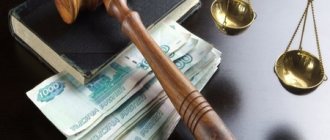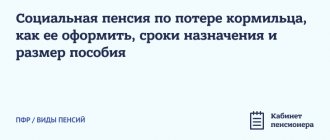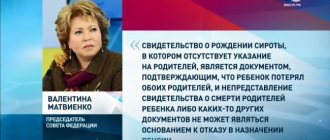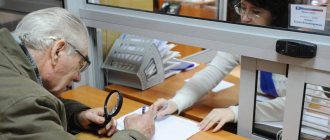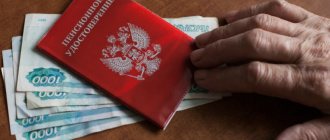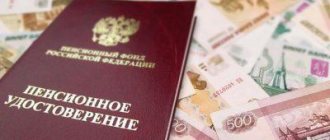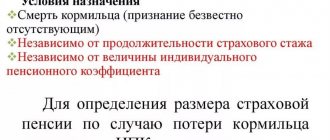Home > Pension insurance subjects > Pensioners > Deductions from pensions > Collection of overpayments
- Collapse
- Expand
Article navigation
- What can cause an overpayment of pension amounts?
- If you overpaid your pension, can they recover it? For what period can the Pension Fund withhold amounts?
3 463
Today, there are several grounds for making deductions from the pension amounts of citizens. The main reason is the person’s reluctance to voluntarily return the funds . Quite often, deductions are made from citizens who have not promptly provided information affecting the amount of pension benefits they receive or the fact of their receipt (i.e., if there has been an overpayment of pensions).
The main criteria for deduction from a pension are:
- a court decision to recover pension amounts and fixed payments due to abuse by a citizen;
- decision of the Pension Fund of Russia bodies , which provide pension provision, on the recovery of a pension and a fixed payment to it, excessively transferred to the pensioner;
- executive documents.
In case of overpayment of pensions, the Pension Fund can recover them from the citizen’s pension, but the withheld amount should not exceed 20% (in some cases 50%).
What can cause an overpayment of pension amounts?
Overpayment refers to the amount of pension and other payments that fall within the competence of the Pension Fund that is overpaid Below are the categories of citizens who most often experience debt.
- Pensioners-students who are paid a survivor's pension. When establishing this pension, one of the conditions is that the student is studying full-time. After expulsion from an educational institution or conscription into the army, this category of pensioners loses the right to receive security, but forgets to inform the Pension Fund about this fact.
- Citizens who care for disabled children, group 1 disabled people, and elderly people (over 80 years old). Here it must be recalled that only able-bodied non-working citizens . In this group, the bulk of overpayments occur due to the fact that citizens who have arranged to care for their grandparents, neighbors, etc., after a while may forget that they should not get a job. If it turns out that the caregiver worked or retired, the overpayment is collected from the caregiver and not from the pensioner.
- Citizens who receive a minimum pension (below the subsistence level of a pensioner). In this case, the person is provided with a federal or regional social supplement (SD). The additional payment is assigned only to non-working pensioners. After returning to work, the SD is withdrawn, and the overpaid amount of funds is subject to recovery from the pensioner.
All pensioners who receive payments related to training or employment, when assigning a pension, pension and compensation, sign an obligation that clearly defines the restrictions and deadlines within which they need to inform the Pension Fund of all changes.
If you overpaid your pension, can they recover it?
The citizen must return all illegally received funds to the Pension Fund budget. There are two options here: forced and voluntary . In case of voluntary return of the overpayment, the person writes an application and returns the money in cash (payment by receipt through the bank) or non-cash (deduction from pension) way. If a citizen refuses to return the funds overpaid to him, then the Pension Fund of the Russian Federation has the right to file a claim in court, and payment will occur after the court’s decision (including all legal costs).
In addition, if it is proven that the citizen did this intentionally, then he faces a rather large fine and an article for fraud .
In some cases provided for by law, deductions from pension benefits can be made without the consent of the pensioner ; the amount of deduction in this case is no more than 20% of the pension .
For what period can the Pension Fund withhold amounts?
In accordance with Art. 196 Civil Code of the Russian Federation:
- The general limitation period is 3 years from the date determined according to Art. 200 of this code.
- The limitation period cannot exceed 10 years from the date of violation of the right for the protection of which this period was established. An exception is cases established by Federal Law No. 35-FZ of March 6, 2006.
following cannot be returned as unjust enrichment :
- property that was transferred to fulfill obligations when the statute of limitations expired;
- property transferred in fulfillment of an obligation before the deadline for fulfillment, unless otherwise provided by the obligation;
- funds and other property provided in fulfillment of a non-existent obligation, if the acquirer proves that the person who requires the return provided the property for charity or knew about the absence of an obligation;
- salary and payments equivalent to it, benefits, alimony, pensions, scholarships, compensation for harm caused to health or life and other payments that a person receives as a means of subsistence, if there is no dishonesty or accounting error on his part.
Taxes
The procedure for taxation of deductions from salary at the initiative of an employee depends on who these funds are intended for: a third-party recipient or the organization itself.
If withholdings are to be transferred to a third party recipient, then the organization is only providing remittance services. In this case, the entire amount of the employee’s salary (before voluntary deductions) is included in the calculation of taxes and mandatory contributions. The deductions themselves do not affect the taxation procedure in any way. This procedure follows from the provisions of the Tax Code of the Russian Federation and Article 8 of Law No. 212-FZ of July 24, 2009.
If the recipient of the withheld amounts is the organization itself, they can also participate in the calculation of taxes. For example, if an organization deducts interest on a loan issued to an employee.
How is an overpaid pension collected?
Excessively transferred pension amounts are subject to reimbursement if the pensioner submits documents that contain inaccurate information, untimely notification or failure to report the occurrence of circumstances leading to a change in the amount of the pension or suspension of its payment.
The decision of the Pension Fund to withhold overpaid payments to a pensioner is made on the basis of official papers: inventory reports, audits, inspections and other documents that record the fact of overpayment . This decision is conditionally classified as an executive document.
Deductions from pension payments based on the decision of the Pension Fund are made from the 1st day of the month following the month in which the corresponding decision was made. The monthly amount of deduction based on the decision of the Pension Fund cannot exceed 20% of the pension (in some cases, up to 50% can be deducted).
can appeal the decision of the Pension Fund to withhold from the pension payment or to collect the excessively transferred pension amounts to a higher pension authority or in court.
If an audit reveals abuse on the part of a pensioner, for example, the provision of papers with knowingly false information, which led to the illegal establishment of pension benefits, the Pension Fund of the Russian Federation transfers the materials to the prosecutor's office. The prosecutor's office investigates the circumstances, brings criminal charges and at the same time sends a statement of claim to the court to recover damages caused.
Deduction amount
Situation: how much can be withheld from an employee’s salary on his initiative?
Make deductions from an employee’s salary on his initiative without restrictions.
The Law on Enforcement Proceedings limits the amount of deductions for enforcement documents (Article 99 of the Law of October 2, 2007 No. 229-FZ). The Labor Code of the Russian Federation establishes the grounds and standards for deductions by order of the organization (Article 130 of the Labor Code of the Russian Federation). The legislation does not impose other restrictions on the amount of deductions.
Therefore, at the initiative of an employee, up to 100 percent of income can be withheld from his earnings, but only after personal income tax is withheld from the amount of income (paragraph 2, paragraph 1, article 210 of the Tax Code of the Russian Federation).
Similar conclusions follow from the letter of Rostrud dated September 16, 2012 No. PR/7156-6-1.
How to avoid collection or reduce the amount?
A person who does not have any independent income or property of his own can completely avoid collection. The pensioner most likely will not be able to do this if the bailiffs properly perform their official duties.
Therefore, the debtor has three options that can ease his fate.
- First — suspension of enforcement proceedings. To do this, you need to go to court with a corresponding application.
Enforcement proceedings at the request of the debtor may be suspended in such cases:- if the debtor has lost legal capacity before the appointment of a guardian or the adoption of a decision on the case;
if the claimant or debtor is undergoing conscription military service, is on a long business trip for work, is undergoing hospital treatment, there is a search for the debtor, his property or a search for a child taken from him - before dismissal from service or the start of service under a contract, return from a business trip, discharge from the hospital or completion of search actions against the debtor, his property or completion of the search for the selected child;
- if executive actions, as well as executive documents, are disputed - until the final consideration of the issue on the merits;
- in other cases - until the cessation of the circumstances that became the basis for the suspension of enforcement proceedings.
- Second option to avoid collection - termination of enforcement proceedings.
The application is submitted according to the same rules as the application for suspension. As a result of considering the application, the judge issues a ruling and sends copies of it to the bailiff, the collector and the debtor.The debtor may submit an application to terminate enforcement proceedings in the following situations:
- if a settlement agreement is signed with the claimant and approved by the court;
in case of recognition of the debtor as missing or his death, if the claims or obligations do not pass to the heir or manager of the property of the absentee;
- if the period established by law for this type of recovery has expired;
- in case of cancellation of a judicial act.
- The third option is that if no grounds for suspending or terminating the proceedings could be found, then in order to avoid deductions from the pension, you can pay the amount of the existing debt voluntarily.
This will help avoid an enforcement fee charged on the amount collected, therefore, the debtor will reduce the amount of his expenses.
However, it is worth noting that this method delays the execution process, i.e. It is possible to avoid collection only for a certain period of time, but not to completely free yourself from the obligation to pay the debt.
If a pensioner-debtor changes his place of residence within the territory of the Russian Federation, the writ of execution will “follow” the debtor to the new address of residence. As a rule, the writ of execution is sent to the new place of residence along with the pension file . Based on these data, the Pension Fund of the Pension Fund at the new place of registration of the pensioner continues to withhold excess transferred amounts from the pension provision.
3 463
Comments (25)
Showing 25 of 25
- Natalya 05/12/2017 at 14:11
Good afternoon Can I voluntarily reimburse the pension payments that were overpaid to me in a lump sum so that there are no monthly deductions?answer
- Yulia 05/12/2017 at 17:16
Hello. Yes, you have the right to do this. Voluntary consent to return the amounts received is formalized by an application to the Pension Fund, which will be attached to your pension file.
answer
- Dmitry 12/19/2017 at 10:56
In this case, after the first such payment, you can go to court and declare the actions of Pension Fund employees illegal and stop payments altogether.
answer
Hello. I am a disabled person of the third group, I opened an individual entrepreneur in 2012. I recently received a letter demanding the return of over-received amounts. I found out that I received a social supplement until February 2020. Tell me, will the amount be withheld from me for all the years since the opening of the business or only those that fall within three years?
answer
Good afternoon My husband is a full-time student receiving a survivor's pension. After the decision to quit studying, payments from the Pension Fund stopped. Recently, a statement of claim was received regarding overpaid funds for the year in which the spouse actually studied full-time. Certificates were provided for each of the two semesters. At the moment, the Pension Fund says that they have not received any certificates from the husband. My husband doesn't work. Can I, as a legal spouse, be required to pay the resulting debt for my husband?
answer
Oksana 09.25.2017 at 10:32
Isn’t it easier for your husband to go to his educational institution with documents and ask for a certificate stating that during these periods for which the amounts are withheld from him, he studied full-time? You should not be forced to pay.
answer
How did it end for you? A similar situation - they present an overpayment for two years.
answer
I have been disabled since childhood, and when my mother retired (in 2004), she was awarded an increased pension (at that time I was not working yet). Six months later, I got a job, but my mother continued to receive an increased pension.
At the moment, the Pension Fund, in April, began to calculate part of the pension to pay off the debt. But the fact is that when the HR department at work drew up documents for a pension, the application for an increased pension and even the signature on the application was not made by my mother’s hand.
When contacting the prosecutor's office, my mother was advised to write a statement so that they could look into it. Can you tell me where I can find a sample application? We can't find him anywhere.
answer
- Dmitry 12/19/2017 at 10:58
It is written in free form.
answer
10 years ago I provided 2 neighbors with social benefits to care for a disabled pensioner. They received a pension increase of 1,200 rubles. The other day I wrote a letter of refusal. During these 10 years, I was officially employed for 3 months. Can this payment now be withdrawn from me for the period during which I worked?
answer
- Dmitry 12/19/2017 at 11:02
They can, but a competent representative will easily fight you off in court. The fact is that the Pension Fund of Russia, being a professional participant in such relationships, has created a completely corrupt scheme and there are usually so many violations that not every judge can sort them out. The PRF can act in accordance with the law and withhold these amounts (overreceived) from the recipients’ pensions, but they will most likely want to receive this money from you as part of civil proceedings, arguing 1064 and 1102 of the Civil Code of the Russian Federation. In this case, you should refer to Part 2 of Article 1064 and 1109 of the Civil Code of the Russian Federation and prove that the direct cause of harm are the employees of the pension fund. It is not difficult.
answer
Hello. I am a disabled person of the third group, since 2012 I have been registered in Moscow from the Moscow region. I have been working for a long time - from 2005 until now (now at OJSC Transinzhstroy). When I retired in Moscow, I gave all my documents with my work book and told them that there was a job. And I asked them: will the pension be half or full?
But they answered that they didn’t know, and said there was work on the computer in the database. After that, after one month I received a full pension and was naive. And only recently I received a letter demanding the return of overpaid amounts - 380 thousand rubles. I found out that I received social benefits from 2012 to 2020.
Tell me, will the amount be deducted from me for all the years? What should I do?
answer
- Eduard 12/08/2017 at 19:20
Hello, Elena! The size of the paid pension until 2020 did not depend on the fact of work! Therefore, it didn’t matter whether you worked or not, you were still assigned and paid a full pension, not half. Since February 2020, indexation of pensions for working pensioners has been cancelled.
But the social supplement to pensions up to the subsistence level was actually paid and is paid only to non-working citizens ! And if you really hid the fact that you were employed, then the return of the overpaid amounts would fall on your shoulders. But if you initially stated this and did not hide it, then we can assume that this was a mistake by the employees of your pension fund.
In such a situation, first you need to go there and let them show you your application for a pension from 2012. There, there is a special column about work. If you put a mark that you are working, then at least you reported it and the fault is not yours. Also, when submitting documents for a pension, most likely, you provided your work record book , in which there was no record of dismissal for 2012. The PFR employees themselves also request an extract from your individual personal account , which shows the paid contributions from the employer (if you are officially employed).
All these documents should have been correctly assessed by Pension Fund employees when assigning you a pension and federal social supplement. You can use this in court if it comes to it.
answer
Hello. Will a pensioner face sanctions if he moves to another region from the region? equated to the far north, did not immediately apply to transfer the pension file to the region in which he currently lives, but plans to do this 3 years later?
answer
Good afternoon. Regarding payments for caring for pensioners over 80 years of age, the following situation has developed:
Dad is 86 years old today. A neighbor was registered as caregiver (we all work). But today the neighbor refused to leave and withdrew the application. We decided to register it for another person. When the person began to register, we found out that we had overpaid, because the neighbor had been working somewhere for 3 years. They refused the new application and offered to pay half the amount. Are they justified in their refusal to issue care benefits to a new person and who should pay this overpayment? Thank you.
answer
Hello. My dad is an old-age pensioner and receives professional disability. disease since 2007 At the end of 2020, he moved to another region and applied for a new place of residence. An old-age pension was assigned to him and is being paid. But the documents regarding disability did not arrive.
Soon a letter arrived from his previous place of residence stating that his disability pension had been overpaid. It turned out that when calculating the average for assigning a pension, the Pension Fund employee made an arithmetic error, which is why the initial payment of the pension was incorrectly established. Now the Pension Fund is demanding the return of the overpaid pension for 10 years. And this is not a small amount!
Is the request of the Pension Fund legal? They write that dad got rich illegally, although he had no idea that his pension was being paid incorrectly. When he was appointed, no one explained to him what this payment consisted of, they only let him sign and that’s it.
answer
Good afternoon Please tell me, my sister was registered to care for my grandfather, who is 82 years old, and he was paid an additional 1,300 rubles towards his pension. My sister is a part-time student and she had to take a part-time job and get a part-time job for 3 hours a day. At the moment, Pension Fund employees are demanding that the money be returned within 6 months. Is this legal? If she worked part-time in the evening for 3 hours.
answer
Hello, my husband received a survivor’s pension as a student from 2013 to 2020, he was provided with a certificate from the college, but in 2020 he went to work officially, since he could not appear at the Pension Fund at his place of registration, he said orally, by phone, that he would work officially. But pension payments continued to arrive. Now the Pension Fund is demanding compensation for the overpayment, a subpoena has already arrived, although transfers to the Pension Fund from the official place of work were made and the Pension Fund should have stopped paying the pension right away. There is no opportunity to appear in court. Will money be awarded?
answer
Hello. After my husband died in 2011, I switched to a survivor's pension. Due to ignorance of the law prohibiting work with this type of pension, in 2012 I officially got a job using a work book and worked for 9 months.
Payments of the insurance pension were not interrupted; during this period, the enterprise paid all required taxes to the Pension Fund. I informed the Pension Fund that I had gotten a job and wanted to know the size of my labor pension in order to compare. But, this was a personal appeal in oral form.
At the moment, I would like to return to my work pension, which gives me the right to work part-time, as well as free travel to a vacation spot every 2 years, I am a resident of the Far North. The PF department said that the transition is possible only through the recovery of the illegally paid pension amount for 9 months, about 100 thousand rubles.
Question: Is it possible that this issue will be resolved in court without penalties, taking into account that more than 5 years have passed since the fact of employment (statute of limitations) and the absence of concealment of employment in order to receive a pension (registration under the Labor Code and deduction of contributions to the Pension Fund by the enterprise)? What is the practice of considering such cases in court?
answer
Hello. I am the mother of a child who has been disabled since childhood, group 2. When the pension was established, the carer was the father, since he did not work. About a year later we divorced. The child, of course, stayed with me. My father didn’t help us, and I received a pension with the same bonus.
After some time, the father, it turns out, received a disability pension for himself, but did not take into account that he was a caregiver. He did not write a statement refusing the care allowance. I didn’t know that he had retired, since he still has about ten years to go before he reaches old age.
Please tell me which of us should return the overpayment? Thank you. Really looking forward to the answer.
answer
Good afternoon! My son, a group 3 disabled child, was sent a letter from the Pension Fund about the need to voluntarily repay within a month the excess pension received from June 2004 to January 2014 in the amount of 74,000 rubles. 14 years have passed.
What is the statute of limitations for overpaid amounts? Thank you.
answer
Hello! I am a student and receive a survivor's pension. In the period from 16 to 18 years old, I worked at McDonald's, came to the Pension Fund and gave them a work book, where it was written that I got a job. As a result, during this period I received a debt. Can you please tell me what to do?
answer
Good afternoon! Today my mother was assessed a debt of 600 thousand rubles. and withhold 20% from the pension. She was once a working pensioner (received approximately 7-9 thousand rubles), there was some kind of “Luzhkov” allowance. Now, as it turns out, they are counting it out. Please tell me, is it possible to somehow avoid/stop these payments? Mom is 71 years old. Thank you!
answer
I was registered with the Central Tax Service until November 19, 2014 inclusive. On November 21, 2014, I filled out an application for caring for a disabled person, providing all the necessary documents that are reflected in the application. The care allowance was accrued in full in the amount of 1200 rubles. from 05.11.2014 - the moment of establishment of disability 1 gr. There was an overlap between the periods for receiving unemployment benefits and care benefits. At the same time, the Pension Fund explained that the law accrues benefits from the month of filing the application. In 2020, the pensioner dies, and in 2020 the Pension Fund notifies about an overpayment of 600 rubles. In 2020, the Pension Fund of the Russian Federation is suing for reimbursement of the overpayment, providing a certificate from the central bank, which indicates that from November 1, 2014 to November 19, 2014, it did not receive benefits and was not registered. Next is a letter from the Central Bank, which states that the certificate was issued erroneously due to a failure of the Catharsis program and was provided to the Pension Fund intentionally. I did not receive such a certificate and did not provide it. Based on this certificate, the court decided to satisfy the PFR’s claim, without taking into account that the correct CZN certificate I initially provided was indicated in the list of documents. At the time of verification, this certificate was not in the file, and I was charged with providing false information.
I ask for advice, how can I prove that I’m right? The CZN does not answer who requested it and in what year the erroneous certificate was provided.
answer
Hello! My daughter is a full-time student and received a survivor's pension. On October 23, 2020, she turned 23 years old, but the transfers were made for November and December 2020. Now the pension fund is demanding the overpaid amount be returned. What if she has no income, she was overpaid through no fault of hers, and I have no way to return such an amount. We did not deceive the pension fund, did not provide false documents, and did not track payment deadlines. After all, the pension fund should have done this.
answer
Share your opinionCancel reply
Accounting
As a general rule, in accounting, the amount of deductions at the request of an employee should be reflected in the entry:
Debit 70 Credit 76
– payments are withheld from wages at the initiative of the employee.
An example of reflecting in accounting deductions from an employee’s salary on his initiative. The organization applies a general taxation system
According to the statement of the manager of Alpha LLC A.S. Kondratiev is deducted 900 rubles from his salary every month. and is transferred to his personal account to the mobile operator. Kondratyev’s monthly salary is 16,000 rubles. Kondratiev has no rights to deductions for personal income tax. Alfa charges insurance premiums for pension (medical, social) insurance at the general rate. The organization pays contributions for insurance against accidents and occupational diseases at a rate of 0.2 percent.
Alpha's accountant makes the following monthly accounting entries:
Debit 26 Credit 70 – 16,000 rub. – Kondratiev’s salary was accrued;
Debit 26 Credit 69 “Settlements with the Pension Fund” – 3520 rubles. (RUB 16,000 × 22%) – pension contributions are accrued to finance the insurance pension;
Debit 26 Credit 69 subaccount “Settlements with the Social Insurance Fund for social insurance contributions” – 464 rubles. (RUB 16,000 × 2.9%) – social insurance contributions are accrued;
Debit 26 Credit 69 “Settlements with FFOMS” – 816 rubles. (RUB 16,000 × 5.1%) – contributions for health insurance to the Federal Compulsory Medical Insurance Fund have been accrued;
Debit 26 Credit 69 subaccount “Settlements with the Social Insurance Fund for contributions to insurance against accidents and occupational diseases” - 32 rubles. (RUB 16,000 × 0.2%) – premiums for insurance against accidents and occupational diseases have been calculated;
Debit 70 Credit 68 subaccount “Personal Income Tax Payments” – 2080 rubles. (RUB 16,000 × 13%) – personal income tax was withheld from Kondratiev’s salary;
Debit 70 Credit 76 – 900 rub. – money was withheld from Kondratyev’s salary at his request;
Debit 70 Credit 50 – 13,020 rub. (16,000 rubles – 2080 rubles – 900 rubles) – Kondratiev’s salary was issued from the cash register;
Debit 76 Credit 51 – 900 rub. – money is transferred to the telecom operator.
An example of how deductions from an employee’s salary are reflected in accounting to repay a loan issued by an organization
On June 30, Alpha LLC provided its manager A.S. Kondratiev received a loan in the amount of 48,000 rubles. for the purchase of a car.
The loan was provided for 12 months at 13 percent per annum. According to the agreement, interest for the use of borrowed funds is accrued from the day following the day the loan is issued and is paid monthly until the debt is repaid. The employee repays the debt monthly in equal installments. The accountant withholds the amount of debt and interest from Kondratiev’s salary.
The interest rate under the loan agreement (13 percent) exceeds 2/3 of the refinancing rate in effect on the date the employee paid interest on the loan. Therefore, Kondratiev does not receive any material benefit from the loan.
Kondratiev’s monthly salary is 30,000 rubles.
From his salary for July, the Alpha accountant withholds: 48,000 rubles. : 12 months + 48,000 rub. × 13%: 365 days. × 31 days = 4529.97 rub.
The following entries were made in the organization's accounting records.
In June:
Debit 73 Credit 50 – 48,000 rub. – a cash loan was issued to Kondratiev;
In July and subsequent months of the loan agreement:
Debit 73 Credit 91-1 – 529.97 rub. – interest accrued for the use of borrowed funds;
Debit 70 Credit 73 – 4529.97 rub. – the employee repaid part of the loan and interest for using it.
Reflect the deduction of additional insurance contributions to the Pension Fund of the Russian Federation to finance the funded pension by writing:
Debit 70 Credit 69 subaccount “Settlements with the Pension Fund for funded pension”
– insurance premiums are withheld from the employee’s salary.
When transferring contributions, make the following entry:
Debit 69 subaccount “Settlements with the Pension Fund for funded pension” Credit 51
– insurance contributions to the Pension Fund of the Russian Federation are listed.
This conclusion follows from the Instructions for the chart of accounts.
An example of reflecting in accounting deductions from an employee’s salary of additional insurance contributions to the Pension Fund of the Russian Federation to finance a funded pension. The organization applies a general taxation system
Employee of Alpha LLC A.S. Kondratyev submitted to the society an application to withhold additional contributions to the Pension Fund of the Russian Federation. The payment amount is fixed – 1000 rubles. per month.
Kondratyev’s monthly salary is 20,000 rubles. Kondratiev has no rights to deductions for personal income tax. Alfa charges insurance premiums for pension (medical, social) insurance at the general rate. The organization pays contributions for insurance against accidents and occupational diseases at a rate of 0.2 percent.
Alpha's accountant makes the following monthly accounting entries:
Debit 26 Credit 70 – 20,000 rub. – Kondratiev’s salary was accrued;
Debit 26 Credit 69 “Settlements with the Pension Fund for insurance pensions” – 4,400 rubles. (RUB 20,000 × 22%) – pension contributions are accrued to finance the insurance pension;
Debit 26 Credit 69 subaccount “Settlements with the Social Insurance Fund for social insurance contributions” – 580 rubles. (RUB 20,000 × 2.9%) – social insurance contributions are calculated;
Debit 26 Credit 69 “Settlements with FFOMS” – 1020 rubles. (RUB 20,000 × 5.1%) – contributions for health insurance to the Federal Compulsory Medical Insurance Fund are accrued;
Debit 26 Credit 69 subaccount “Settlements with the Social Insurance Fund for contributions to insurance against accidents and occupational diseases” - 40 rubles. (RUB 20,000 × 0.2%) – premiums for insurance against accidents and occupational diseases have been calculated;
Debit 70 Credit 68 subaccount “Personal Income Tax Payments” – 2600 rubles. (RUB 20,000 × 13%) – personal income tax was withheld from Kondratiev’s salary;
Debit 70 Credit 69 subaccount “Settlements with the Pension Fund for funded pension” – 1000 rubles. – the amount of additional insurance contributions to the Pension Fund of the Russian Federation is withheld;
Debit 70 Credit 50 – 16,400 rub. (20,000 rubles – 2600 rubles – 1000 rubles) – Kondratiev’s salary was issued from the cash register;
Debit 69 subaccount “Settlements with the Pension Fund for funded pension” Credit 51 – 1000 rubles. – money was transferred to the Pension Fund of the Russian Federation.

